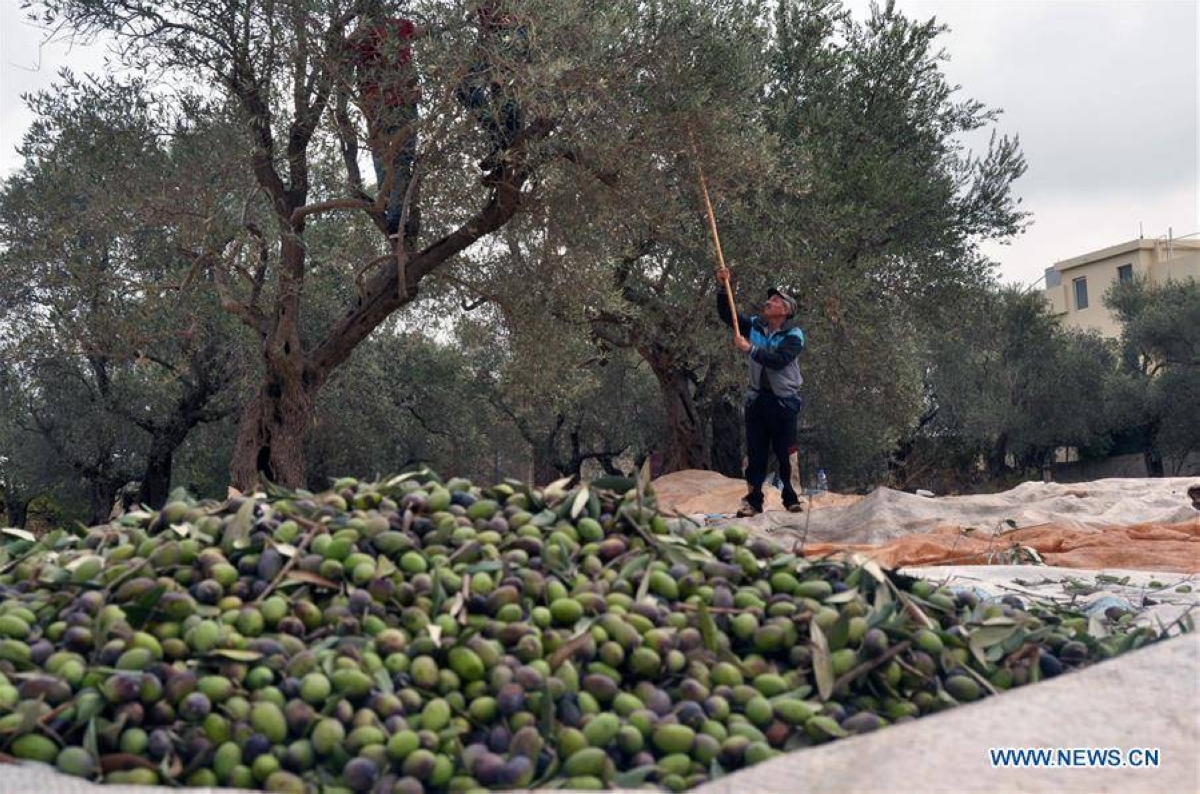BEIRUT: The olives massively planted in southern Lebanon are ripening in time following a sun-soaked summer, awaiting to be harvested in bulk.
But local farmers have resignedly hesitated at the chance that Israeli military drones, which kept loitering near the Lebanese border areas, might mistake the rustles of crops being harvested as a target.
“With drones flying over our heads, olives-picking is fraught with danger,” Adel Khoury, a farmer from the southern Lebanese village of Rachaya al-Foukhar, told Xinhua.
“With every shell sound, we flee, leaving the fruits and our belongings in the fields, awaiting developments in the next day which are difficult to predict,” the 70-year-old farmer said.
 BAD FOR BUSINESS This Oct. 17, 2018 file photo shows a farmer harvesting olives in the district of Koura in north Lebanon. Olive harvest in Lebanon is hampered by Israeli attacks. XINHUA PHOTO
BAD FOR BUSINESS This Oct. 17, 2018 file photo shows a farmer harvesting olives in the district of Koura in north Lebanon. Olive harvest in Lebanon is hampered by Israeli attacks. XINHUA PHOTO
For more than a month, Israel has continued assaults on southern Lebanon in retaliation for rocket-firing by Lebanon-based military groups toward Israeli sites in tandem with the ongoing Israel-Hamas conflict.
Jamal Hamdan, a Lebanese farmer who owns a vast olive orchard in southeastern Abou Qamha village, expressed worry that the conflict would ruin the harvest season, as he repeatedly heard the news about Israeli attacks destroying vast olive groves.
Hamdan said the conflict completely dampened the delight of seeing olives budding at a time when olive oil, known worldwide as a “liquid gold” of the catering sector, saw its retail price in Lebanon increase from $60 to $140 per 16-kilogram container.
The olive harvest in the southern border region was supposed to be completed by the end of October, but the Israeli bombardment hampered the process, putting Lebanese farmers on pins and needles, he said.
Last winter, a depressed olive oil market prompted many farmers to abandon fruitful trees and burn them as firewood, Khoury said. But a sudden increase in demand in the following months restored farmers’ confidence in growing olives, Hamdan added.
The oil-rich fruit sustains the livelihood of more than 80 percent of people in the border areas, Adel Yahya, a Lebanese farmer from the southeastern village of Halta, told Xinhua.
Olive fruits have started to get over-ripened and fall on the ground, as people from border villages were not able to harvest them, he said.
“Farmers will lose most of their crops,” Yahya lamented.
The Lebanon-Israel border has witnessed increased clashes after Lebanese armed group Hezbollah fired dozens of rockets toward Israeli military sites on October 8 in support of the Hamas attacks on Israel the previous day, prompting the Israeli forces to respond by firing heavy artillery toward several areas in southeastern Lebanon.
Lebanon boasts some 15 million olive trees spanning 45,000 hectares of area, with an annual production of 150,000 to 250,000 tons of virgin oil.
So far, some 12,000 hectares of olive orchards have been affected by the Israel strikes, Lebanese Agriculture Minister Abbas Hajj Hassan recently told Xinhua.
Citing a survey conducted by joint committees of the Lebanese Agriculture Ministry and relevant military authorities, he added that over 45,000 olive trees and thousands of hectares of farmlands and forest were burnt under Israeli bombs containing phosphorus, a poisonous and combustible nonmetal.
Riad Harb, head of the olive oil producers syndicate in southern Lebanon, said about 60 percent of farmers have not been able to harvest their crops, calling on authorities to reach a truce under the supervision of the United Nations Interim Force in Lebanon to allow farmers to finish harvesting before winter.
*****
Credit belongs to : www.manilatimes.net
 Atin Ito First Filipino Community Newspaper in Ontario
Atin Ito First Filipino Community Newspaper in Ontario






